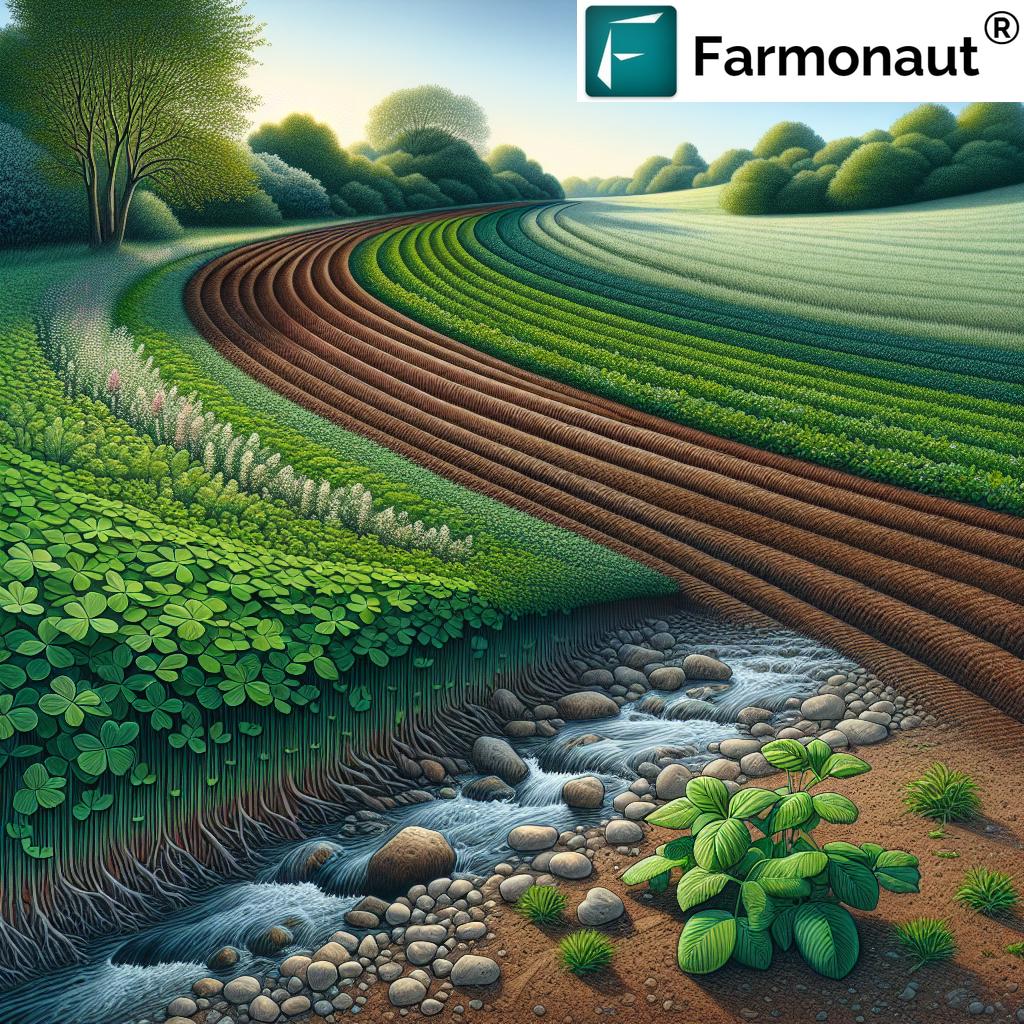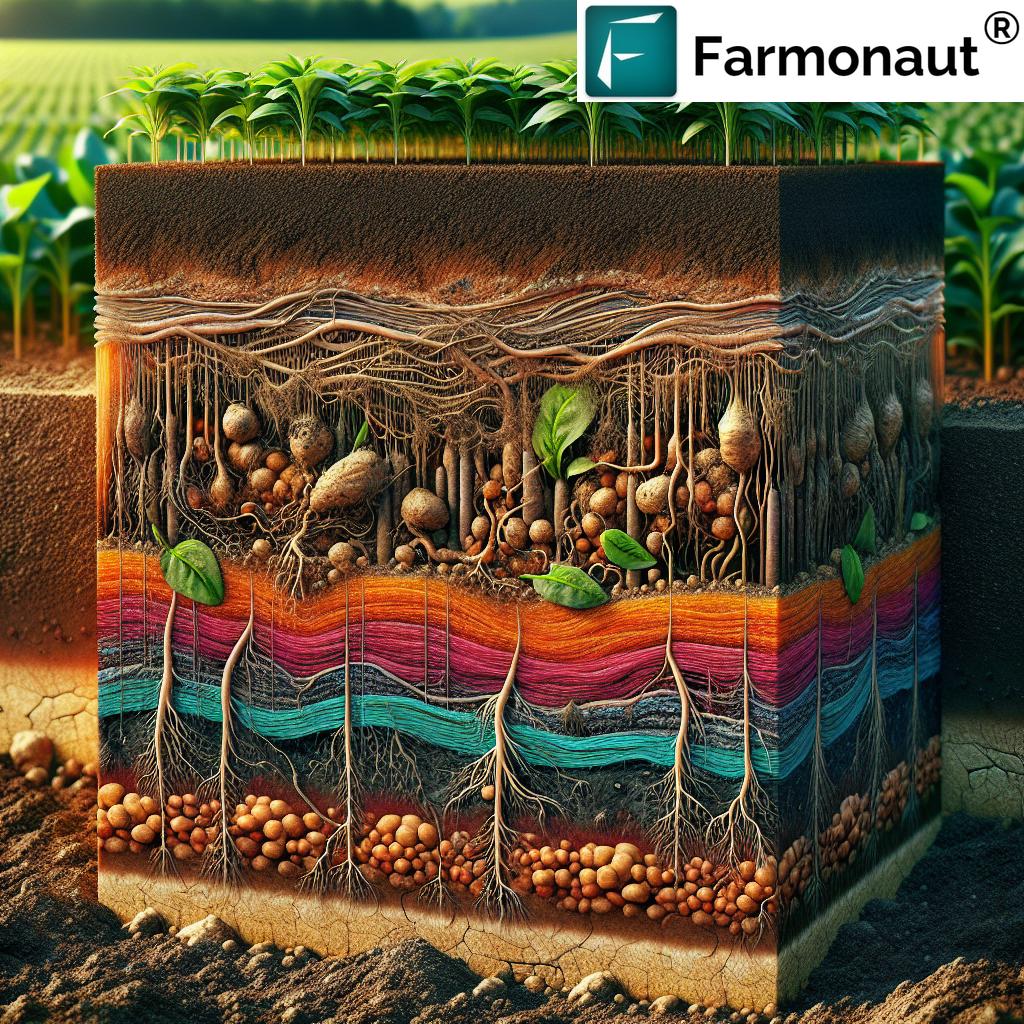Table of Contents
- Introduction: Compost for Plants Context in 2026
- Compost for Plants Trivia
- Understanding Compost: The Ultimate Guide to Plant Growth
- Best Compost for Plants: Key Features & Plant Needs
- Vermicompost for Plants: Supercharging Sustainable Growth
- Compost Tea for Plants: Liquid Gold for Robust Health
- Comparative Table: Compost Types & Their Benefits
- Applications: Compost’s Role in Horticulture & House Plants
- Compost for Plants in Regenerative Agriculture & Forestry
- Future Trends: Compost, Soil Health, & Sustainable Practices
- Farmonaut’s Satellite Technology: Supporting Sustainable Compost Applications
- Vermicompost for Plants Trivia
- Compost, Vermicompost, & Compost Tea: A Comparative Table
- Frequently Asked Questions (FAQ)
- Conclusion: Invigorate Your Soil & Growth in 2026
Compost for Plants: 7 Powerful Ways to Boost Growth in 2026
In the context of agriculture, sustainable farming, and global food security, compost for plants remains one of the most invaluable resources for enhancing soil health, increasing plant growth, and supporting vibrant ecosystems in 2026 and beyond.
As climate change, soil degradation, and the demand for organic produce and eco-friendly methods reshape modern agriculture, leveraging the best compost for plants—including vermicompost for plants and compost tea for plants—has never been greater in significance. This article is your ultimate guide to the power of compost, delving into types, applications, and seven game-changing strategies to boost sustainable growth from field to house plant.
“Compost improves soil health, increasing plant growth rates by up to 40% compared to non-composted soil in 2025.”
Understanding Compost for Plants: The Ultimate Guide to Sustainable Plant Growth in 2025-2026
Compost for plants is decomposed organic matter made from plant residues, food scraps, and manure. In its mature form, compost enriches soil with nutrient content, enhances soil structure, and improves moisture retention capabilities. Increasing awareness in 2026 about soil degradation and climate change is driving more farmers and gardeners to adopt composting, leveraging these invaluable resources to keep agricultural systems sustainable.
The biological processes involved in composting boost microbial diversity, aid in nutrient cycling, and increase valuable soil organic matter. Compost is integral for regenerative agriculture—a movement shifting global agricultural practices toward more environmentally friendly and restorative methods.
- Compost reduces dependency on synthetic fertilizers, releasing nutrients slowly (minimizing nutrient runoff and pollution).
- Enhances soil’s carbon sequestration, helping address climate change.
- Supports natural disease suppression via improved microbial activity.
- Improves soil aeration and water retention, crucial for plant vitality and drought resilience.
Best Compost for Plants: What to Look For in 2026
Choosing the best compost for plants depends on plant type, soil needs, and the targeted growing environment (outdoor farming, horticulture, or indoor house plants). Here’s what to consider:
Key Characteristics of High-Quality Compost
- Mature, well-aerated, and nutrient-rich: Balanced nitrogen (N), phosphorus (P), and potassium (K) for supporting robust plant growth.
- Free from pathogens and weed seeds: Made with proper heat and microbial activity to destroy pests and disease agents.
- Crumbly texture, rich earth aroma: Ensures easy integration into soils and signals well-decomposed organic matter.
- No unpleasant odor: Indicates thorough decomposition and absence of harmful fermentation.
- Increases microbial and nutrient content: Superior compost delivers not just base minerals but boosts microbial activity for improved soil health.
Best Compost for House Plants: Lighter Matters
Compost for house plants or container gardening differs from field applications. These blends must be lighter, well-draining, and tailored to prevent root rot.
- Commercial potting composts often combine peat or coco coir with composted matter, but homemade blends—mixing compost, perlite, and vermiculite—are trending for their organic, chemical-free profile.
- Best compost for house plants supports root health, prevents compaction, and maintains excellent plant vitality indoors.
Vermicompost for Plants: Supercharging Plant Growth with Nature’s Super Compost
Vermicompost for plants is the product of earthworms digesting organic waste, such as plant residues, food scraps, and manure. Its unique composition makes it a superior choice for plant growth in both large-scale farming and small urban gardens.
Key features of vermicompost include:
- Higher levels of beneficial microbes than traditional compost.
- Contains plant hormones (e.g., auxins, cytokinins) that improve germination, root development, and resistance to stress.
- Rich in humic acids which stimulate robust root and plant growth.
- Contains more available nutrients: Nitrogen, phosphorus, potassium, and micronutrients in forms accessible to roots.
Regenerative agriculture in 2026 increasingly embraces vermicompost to reduce synthetic inputs, improve soil health, and foster eco-friendly farming.
“Vermicompost can boost nutrient availability in soil by up to 50%, enhancing sustainable crop yield for eco-friendly farming.”
Compost Tea for Plants: Liquid Gold for Robust Plant Health
Compost tea for plants is a liquid extract brewed by soaking compost in water, typically with aeration to stimulate microbial activity. It’s designed for rapid delivery of nutrients and beneficial microbes directly to plant roots or leaves.
Benefits of Compost Tea
- Quickly improves plant health and vitality. Plants treated with compost tea often show greener foliage and increased resistance to pests and diseases.
- Offers a sustainable, organic alternative to chemical pesticides and fertilizers.
- Can be applied as a foliar spray or soil drench—making it versatile for all plant types, including house plants and field crops.
- Boosts microbial colonies on leaf surfaces, creating a barrier to pathogens.
Compost tea works especially well in large-scale agriculture to enhance nutrient uptake and in urban gardening for vigorous house plant growth.
How Does Compost Tea Stack Up Against Synthetic Inputs?
- Compost teas provide both nutrients and living beneficial microbes, compared to synthetics offering quick nutrients with no microbial boost.
- Reduces fertilizer and pesticide runoff, supporting cleaner waterways—crucial for sustainable farming and city gardening in 2026.
Explore satellite-based solutions for soil and crop health monitoring: Our carbon footprinting tools empower farmers and gardeners to track environmental impacts and optimize resource use for sustainable harvests.
Interested in verifying supply chains for organic compost and plant products? Learn more about Farmonaut’s blockchain-powered product traceability—ensuring transparency from farm to fork.
Compost for Plants: Comparative Benefits Table of Compost Types
*Growth impact depends on frequency, plant type, and application method.
Compost for House Plants & Horticulture: Practical Applications for 2026
Why Use Compost for House Plants?
House plants require a special compost mix to thrive indoors—balancing organic matter, drainage, and nutrients for sustained growth.
- Peat- or coco-based potting composts (for water retention and aeration) are often combined with organic compost for improved performance.
- Vermicompost is ideal for delicate house plants: Delivers gentle, yet powerful, nutrients to roots without burning or chemical overload.
- Compost tea for house plants: Applied as a foliar mist, it keeps leaves lush and vibrant while boosting resilience to indoor pests.
Compost in Horticulture and Urban Gardens
- Used in elevated garden beds to boost root health and prevent soil erosion.
- Supports flowering and fruiting crops by providing balanced nutrition and microbial support.
- Enhances flavor, aroma, and nutrient density of organically grown produce.
- Contributes to sustainable landscaping and biodiverse urban environments.
Compost for Plants in Regenerative Agriculture & Forestry Practices
Regenerative agriculture in 2026 relies extensively on organic resources like compost to rebuild soil, combat land degradation, and enhance plant growth with fewer synthetic inputs.
Key Ways Compost Supports Regenerative Farming
- Increases soil organic matter, supporting carbon sequestration—a necessary step for carbon footprint reduction in farming.
- Reduces need for synthetic fertilizers and pesticides, making crops more eco-friendly.
- Promotes beneficial microbial activity, boosting resilience against crop diseases and improving long-term yields.
- Improves soil water-holding capacity, critical for drought-prone regions and land restoration projects.
Compost in Forestry & Land Rehabilitation
- Applied to degraded land, mining sites, and reforestation areas to restore fertility and kick-start native vegetation.
- Accelerates plant establishment, improves root networks, and combats erosion—all vital in forestry and tree-plantation projects.
Looking for precision advice on reforestation or plantation projects? Visit our crop plantation and forest advisory platform for AI-driven recommendations and satellite monitoring.
Future Trends: Compost, Soil Health, and Sustainable Farming Practices in 2026
As agriculture evolves toward sustainability, several notable trends are shaping compost applications and soil management:
- Satellite-based soil monitoring provides farmers and stakeholders with real-time data on soil organic matter, plant health, and inputs performance. Advanced tools like Farmonaut’s fleet and resource management further optimize sustainability across agricultural operations.
- Blockchain technology is increasingly used for verified organic compost production and farm traceability, building consumer trust through transparency in compost and food supply chains. Explore how with Farmonaut Product Traceability.
- Custom compost blends tailored to specific crop or house plant needs will dominate, optimizing nutrient delivery and efficiency.
- Compost tea applications via automated irrigation or drone technology promise efficiency in larger operations, ensuring even distribution and scaling up plant health benefits.
Farmonaut’s Satellite Technology: Supporting Sustainable Compost Applications
At Farmonaut, we utilize advanced satellite-based solutions to support sustainable agriculture and effective compost for plant applications:
- Soil Health Monitoring: Our satellite imagery platforms provide real-time NDVI (Normalized Difference Vegetation Index) and soil organic matter analytics, allowing users to track compost impact on their fields.
- AI-Driven Advisory: Our Jeevn AI Advisory System offers personalized composting recommendations, integrating weather, crop stage, and field data to optimize plant growth.
- Blockchain-Based Traceability: We help verify compost and input authenticity—critical for organic certification and eco-labeling in 2026’s sustainability-focused markets.
- Environmental Impact Analysis: Automated carbon footprinting and sustainability metrics support decision-making for farmers embracing regenerative agriculture.
Ready to integrate compost insights with cutting-edge technology?
Try our large-scale farm management suite for satellite-driven planning, monitoring, and advisory—perfect for professional growers in 2026.
For developers looking to integrate satellite and compost data into their solutions, our API is available at
https://sat.farmonaut.com/api. Access full developer documentation here.
Compost, Vermicompost, & Compost Tea: A Detailed Comparative Table for 2026
Frequently Asked Questions (FAQ) About Compost for Plants
1. What is the best compost for plants in 2026?
The best compost depends on your plant type and environment. For field crops and garden beds, mature, nutrient-rich compost free of pathogens is ideal. For house plants, use light, well-draining compost blends, ideally featuring organic matter, peat, coco coir, and/or vermiculite.
2. How does compost for house plants differ from outdoor compost?
Houseplant compost is lighter, better-drained, and less dense to prevent root rot. It often includes airy materials like peat or coco and is optimized for containers.
3. Why is vermicompost for plants considered superior?
Vermicompost is rich in bioavailable nutrients, beneficial microbes, and growth hormones. It boosts microbial activity, improves disease resistance, and offers higher nutrient availability than traditional compost.
4. How is compost tea for plants applied?
Compost tea can be sprayed on foliage to prevent diseases and boost growth, or poured directly at the root zone for faster nutrient delivery and microbial benefits.
5. Can compost replace all synthetic fertilizers?
High-quality compost can dramatically reduce or replace most synthetic fertilizers, especially when combined with vermicompost and compost tea, but plant needs and soil tests should guide your final approach.
6. Is compost necessary for sustainable agriculture?
Yes. Compost is fundamental to any regenerative, sustainable, or organic farming practice, improving soil health, biodiversity, and resilience to changing climates.
7. How can satellite technology support compost application?
Platforms like Farmonaut provide satellite-derived soil health analytics, real-time monitoring, and AI recommendations—helping optimize compost use, reduce waste, and maximize growth and sustainability.
Conclusion: Compost for Plants Remains the Ultimate Guide to Sustainable Plant Growth in 2026
As agriculture and horticulture continue to face new challenges in the era of climate instability and environmental consciousness, compost remains a cornerstone of sustainable plant cultivation.
By leveraging the best compost for plants, including advanced vermicompost and innovative compost tea, growers can enhance soil vitality, foster robust plant growth, and significantly reduce environmental impact in 2026 and beyond.
Whether caring for a single house plant or managing large-scale farms and forestry projects, integrating high-quality compost improves plant health, increases yields, and contributes to a greener planet. Embracing composting practices is both a nod to ancient wisdom and a leap into the future of regenerative agriculture.
Explore the new horizon of sustainable farming with Farmonaut’s advanced monitoring and AI advisory systems, accessible via our web and mobile apps. Remember—healthy soil makes healthy plants, which make a healthy world.











